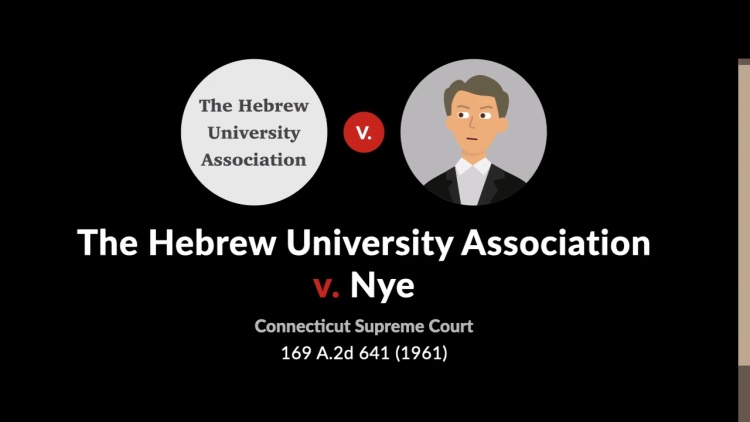The Hebrew University Association v. Nye
Connecticut Supreme Court
169 A.2d 641 (1961)

- Written by Christine Raino, JD
Facts
Ethel S. Yahuda, wife of Abraham S. Yahuda, a Hebrew scholar, acquired ownership of her husband’s entire library after his death. Since Ethel and Abraham had spoken about establishing a research center in Israel, Ethel arranged to meet with officers of the Hebrew University in Jerusalem (the University) (plaintiff) regarding donating Abraham’s library to the University. While there, Ethel announced at a formal luncheon attended by University officials and the president of Israel, among others, that she was giving the library to the University. The next day Ethel approved a press release stating that she gave the library as a gift to the University and thereafter referred to the library on several occasions as belonging to the University. Ethel began to catalogue the library materials and prepare them for shipping to Israel. Although Ethel expressed her intention to ship the library materials to the University by the end of the year in 1954, she did not deliver the library materials to the University before her death in early 1955. In her will, she left the bulk of her estate to a Hebrew charitable institution. The University brought an action against the executors of Ethel’s estate, Nye et al. (Executors) (defendants), seeking a declaratory judgment establishing ownership of the library and an injunction preventing the Executors from disposing of the library property. The trial court held that Ethel’s announcement at the luncheon was a declaration to hold the library in trust for the University. The Executors appealed.
Rule of Law
Issue
Holding and Reasoning (King, J.)
What to do next…
Here's why 904,000 law students have relied on our case briefs:
- Written by law professors and practitioners, not other law students. 47,100 briefs, keyed to 995 casebooks. Top-notch customer support.
- The right amount of information, includes the facts, issues, rule of law, holding and reasoning, and any concurrences and dissents.
- Access in your classes, works on your mobile and tablet. Massive library of related video lessons and high quality multiple-choice questions.
- Easy to use, uniform format for every case brief. Written in plain English, not in legalese. Our briefs summarize and simplify; they don’t just repeat the court’s language.





